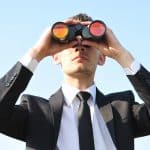To get to AGI, we must first solve the AI challenges of today, not tomorrow

If the World Economic Forum in Davos was any indication, AI safety and security will be this year’s top priority for AI developers and enterprises alike. But first, we must overcome hype-driven distractions that siphon attention, research, and investment away from today’s most pressing AI challenges.
In Davos, leaders from across the technology industry gathered, previewing innovations, and prophesying what’s to come. The excitement was impossible to ignore, and whether it is deserved or not, the annual meeting has built a reputation for exacerbating technology hype cycles and serving as an echo chamber for technology optimists.
Centralizing observability saves businesses time and money

Observability is key to allowing organizations to manage their systems effectively, helping improve performance, cut workloads and save money.
Grafana has released its latest Obervability Survey, based on responses from over 300 industry practitioners which shows that 70 percent of teams are using four or more observability technologies.
What Elon Musk's AI warning says about ethical AI in business

The report by Statista forecasts a significant 21 percent net increase in the United States' GDP by 2030, attributing this growth to the integration of Artificial Intelligence (AI). This projection underscores the immense impact AI is expected to have on economic expansion. However, amid this rapid advancement, tech innovator Elon Musk has expressed serious concerns about the need for AI regulation.
Speaking at the Paris VivaTech event, Musk highlighted the potential dangers of unregulated digital superintelligence. His warnings serve as a vital reminder for businesses to reevaluate their use and engagement with AI technologies, emphasizing the importance of a balanced approach to AI integration in the economic landscape.
Zapier acquires Vowel team and launches AI automation service Zapier Central

Zapier is a name that will be familiar to companies that have explored workflow automation, and like so many other tech firms, it is now grabbing a slice of AI pie.
Announcing the acquisition of the team behind the AI-powered video conferencing tool Vowel, Zapier has also launched a new AI-focused service called Zapier Central. Currently in preview, this is a workspace for creating and using AI bots to help with task automation and workflow optimization.
77 percent of companies have seen breaches in their AI

A new survey of 150 IT security and data science leaders shows that 98 percent of enterprises consider at least some of their AI models crucial to their business success, and 77 percent identified breaches to their AI in the past year.
Yet the study from HiddenLayer shows only 14 percent of IT leaders say their respective companies are planning and testing for adversarial attacks on AI models.
AIOps models deliver limited value say tech leaders

A new study reveals that 97 percent of technology leaders find traditional AIOps models deliver limited value, leaving teams unable to tackle data overload.
The global survey of 1,300 CIOs and technology leaders in large organizations, carried out for Dynatrace, also finds that 88 percent of organizations say the complexity of their technology stack has increased in the past 12 months, and 51 percent say it will continue to increase.
Microsoft is giving click-free access to Copilot in Windows 11

It is no secret that Microsoft has jumped wholeheartedly onto the AI bandwagon, and its Copilot assistant is an important part of this.
Copilot is still in preview, but it has already undergone major work since it first appeared, and now Microsoft is trying to encourage people to use it by making it even easier to access. If clicking a mouse button has been standing between you and a fix of AI-powered assistance, you'll be pleased to hear that click-free access is rolling out to Windows 11 users.
AI integration is among top developer challenges

The biggest software development challenge in 2024 will be incorporating AI into the development process, according to a new report.
The Reveal survey of 585 software developers and IT professionals from Infragistics shows 40.7 percent name this as the top challenge followed by high workload (29.6 percent) and increased customer demands (29.2 percent).
Microsoft makes Copilot in Windows 11 more useful with new capabilities and plugins

Continuing to go all-in on artificial intelligence, Microsoft has announced a series of new features for its Windows 11 AI assistant. The company has announced the capabilities for Copilot as well as introducing new plugins for even more options.
The arrival of new plugins from the like of OpenTable, Shopify and Kayak helps to transform Copilot into something even more useful than it has been so far. It means that the assistant can be used to book restaurant tables as well as suggesting menus for home dining. On top of these plugin-driven additions, Copilot is also gaining new features so it can display system information on demand, and be used to control accessibility features.
Enterprises face problems integrating AI

New research from Tray.io shows that over 90 percent of enterprises are currently experiencing limitations integrating AI into their tech stack.
Almost three-quarters of companies (73 percent) report that more than half of the apps in their tech stack have AI capabilities or AI-augmented features, and 96 say they percent plan to use these features to improve process efficiency and employee productivity, increase customer satisfaction rates and reduce costs.
Google can now train AI with Reddit posts thanks to new Data API access deal

Google and Reddit have "expanded and deepened" their existing partnership in a deal that will give the search giant near-unfettered access to content posted on the site. As well as helping users to find Reddit content via the search engine, the move also means that Redditor's posts will be used to train Google's AI models.
Reddit says that in giving Google access to it Data API, it will be "easier to discover and access the communities and conversations people are looking for". It is being pushed by both companies as a way of promoting the "open internet", but it is something that is proving conversial.
The impact of AI on cybersecurity

The market for AI in cybersecurity is expected to reach more than $133 billion by 2030 according to a new report from Techopedia.
There's both a positive and negative impact from AI use. Hackers using AI has fueled a huge rise in cybercrime, expected to reach a massive $9.22 trillion cost to internet users in 2024, with the vast majority (85 percent) of cybersecurity professionals blaming AI. This rise is for these key reasons: AI increases the speed and volume of attacks, it adapts to specific defenses, and it creates more sophisticated, personalized attacks.
Cybersecurity professionals believe AI will significantly affect their jobs

With responses from more than 1,100 cybersecurity professionals, a new survey reveals that 88 percent of respondents believe that AI will significantly impact their jobs, now or in the near future.
The study from ISC2 shows 35 percent have already witnessed its effects. However, views on exactly what the implications of AI might be are mixed.
Microsoft Build 2024 confirmed for May, with 'AI, Copilots, and more' for developers

Microsoft has confirmed the dates and location of this year's Build conference for developers. The event will be held from May 21 to 23 in the Seattle Convention Center's Summit building, and it may be a chance for everyone to learn more about not only the future of Windows 11, but also the upcoming Windows 12.
Like last year, Microsoft Build 2024 is an in-person event, although online attendance is also possible. So far, Microsoft is promising "AI, Copilots, and more for Developers" and while there are no firm details of precisely what to expect, it is possible to sign up to be notified when registration opens.
Get 'Enterprise AI in the Cloud: A Practical Guide to Deploying End-to-End Machine Learning and ChatGPT Solutions' (worth $48.99) for FREE

Enterprise AI in the Cloud is an indispensable resource for professionals and companies who want to bring new AI technologies like generative AI, ChatGPT, and machine learning (ML) into their suite of cloud-based solutions.
If you want to set up AI platforms in the cloud quickly and confidently and drive your business forward with the power of AI, this book is the ultimate go-to guide.
Recent Headlines
BetaNews, your source for breaking tech news, reviews, and in-depth reporting since 1998.
© 1998-2025 BetaNews, Inc. All Rights Reserved. About Us - Privacy Policy - Cookie Policy - Sitemap.